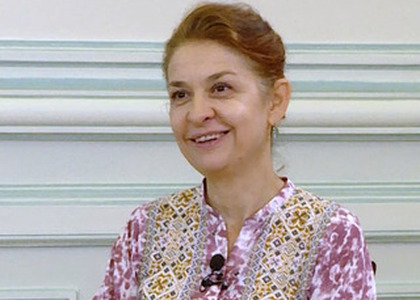>

Interview with Luminița Guțanu, the conductor of the “Symbol” Choir
The Symbol - Jean Lupu Choir will hold an anniversary concert at the Radio Hall in Bucharest, celebrating 35 years of existence on Sunday, October 12th. We shall find out more about this event, along with the evolution of the ensemble in this interview by Cristina Cîrjan with the choir's conductor, Luminița Guțanu.
The Symbol Choir celebrates 35 years of existence. What does it mean for you?
It is a very important moment for the choir and my work as a conductor alike. I have been leading this ensemble for 18 years. It is an impressive age for a children and young adult's choir, given what is currently happening within society. It is very difficult for an ensemble to survive unless supported by a governmental agency. This exceptional choir, which was founded by the teacher and priest Jean Lupu, exists for the past 35 years, and has successfully showcased Romanian music nationally and internationally alike for just as long.
The 35th anniversary will be celebrated with a concert at the Radio Hall on Sunday, October 12th. The guest of honour will be the choir's founder, conductor Jean Lupu. How do you think his presence will affect this event?
The founder will always be the father and heart of an ensemble. It is quite obvious that his presence shall fulfil this role tonight. There shall also be former "symbolists" who had performed under his guidance in the crowd, as well as my own. I believe that there is something extraordinary about the fact that the actual generation will get to interact with the choir's founder, who has reached the wonderful age of 85 years old.
The concert will also feature works which belong to great Romanian composers, such as George Enescu. Can you tell us how you came up with the show and what message do you want to send the audience through the selection?
The audience shall be presented a very diverse repertoire that will represent this ensemble. We will perform religious music complemented by tempos and dynamics. Although some may find this disagreeable, I would like to encourage as many curious or willing people as possible to join us and discover this can be done with religious music, too. Moreover, we have also included works that we have either performed at international competitions, that we've been offered awards for, or belonging to the "Coraliada" National Competition that showcases the works of young composers, and which highlight the choir's history, as our show includes works by old and young composers alike. We will showcase a piece called "Clipa de altădată" (The Moment of Yesteryear), belonging to a student from the composition department of the University of Music, whose name is Ana Creangă. We will also have folk music, which is the ensemble's signature, in a way. There will be folk musicians present along with the choir.
You have been the leader of the Symbol Choir for 18 years. How do you think the ensemble has turned out after all this time?
What is special to this ensemble is that each generation is ever-changing, which is natural for a choir which consists of children and young adults. However, unless you wish for these significant differences to be noticed, it is mandatory to hold high expectations of the output quality, just as I have indeed been leading for 18 years, going through all the stages. The bar is constantly raised, and the repertoire is getting more and more difficult, regardless of the ever-changing generations.
Looking ahead, what goals and projects do you have in mind for the Symbol Choir, and how do you perceive its role in promoting Romanian choral music?
I have always considered separate projects, such as concerts that would be more of a personal touch of the choir. We usually hold these in spring and winter, the latter belonging to the season's holidays. Moreover, we have international travels, competitions, and various collaborations planned as well. The existence of the Symbol - Jean Lupu Choir is essential for Romania's and the international musical sphere alike, in my opinion.
Translated by Andrada-Teodora Ivanov,
University of Bucharest, Faculty of Foreign Languages and Literatures, MTTLC, year I
Corrected by Silvia Petrescu














